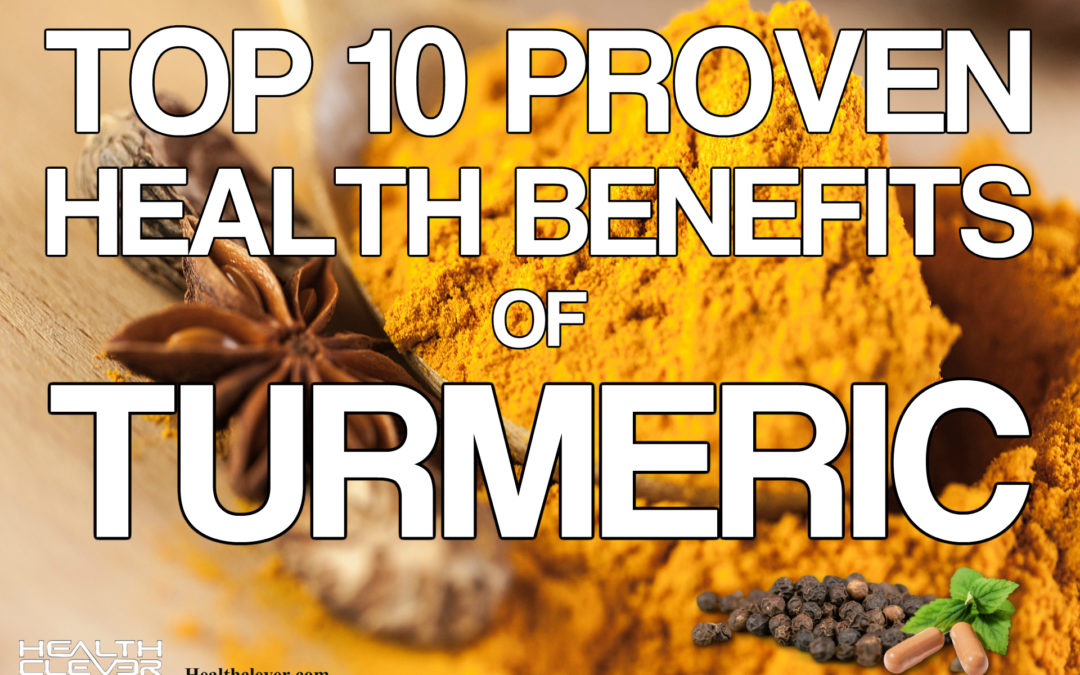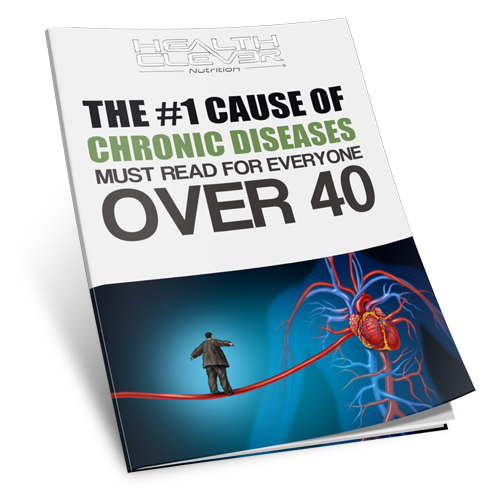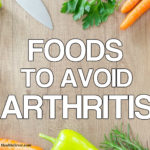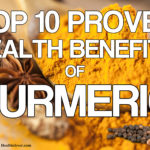Turmeric Benefits – Top 10 Proven Health Benefits of Turmeric and Curcumin
Turmeric Benefits – Introducing ginger’s closest relative and what is undoubtedly the cornerstone of ever curry recipe, Turmeric is a vivid, yellow-orange super spice with a secret. According to nutritionists, it’s not just a seasoning; it’s one of the most complete nutritional supplements on the planet.
Scientists have also proven that in addition to boosting the digestion process, turmeric helps fight infection, reduce inflammation, support healthy liver function, improve the skin’s appearance and much more. And all these can be largely attributed to one main active ingredient in turmeric – Curcumin [1].
1: Boasts of Bioactive Properties
For thousands of years, Turmeric has been used in India as a spice and a medicinal herb. But more recently, scientists have begun backing up what Indians have known for centuries – that it contains plenty of medicinal properties and bioactive compounds [2]. These compounds are referred to as curcuminoids with the most essential one being curcumin.
However, the content of curcumin in turmeric is quite dismal at only 3.14% [3]. This means that it’s extremely difficult to get correct dosages of turmeric curcumin from just using it as a spice in your food.
As such, anyone who wants the full effects will need to take turmeric extracts which usually contain substantial amounts of the compound [4].
2: Improves Memory to Prevent and Treat Alzheimer’s
Although we all forget a few details sometimes, this is a minor memory slip compared to one of the most neurodegenerative diseases on the planet and the leading cause of dementia – Alzheimer’s. Unfortunately, no treatment is available for the disease yet.
However, curcumin has been proven to cross the blood-brain barrier and reverse the oxidative damage that causes Alzheimer’s disease [5]. This active compound found in turmeric benefits the brain by slowing down development of some of these neurodegenerative diseases.
But that’s not all, recent studies also show that people who eat curry regularly score higher on cognitive function tests that those who don’t [6].
3: Nature’s Own Anti-Inflammatory Agent
Inflammation is a very important process that helps your body fight off invaders and repair damage. Without it, certain bacteria and pathogens could easily kill us [7]. But while short term inflammation is advantageous, chronic inflammation can be fatal.
It’s believed that it may cause heart disease, Alzheimer’s, cancer, and other degenerative conditions [8].
According to a recent study, curcumin was found to be more effective than both ibuprofen and aspirin – two of the most common NSAIDs used for treating inflammation [9]. This compound actually works at a molecular level to target different stages of the inflammation pathway and disrupt the process [10].
4: Acts as a Mild Anticoagulant
People with aggravated health conditions usually need medicines known as anticoagulants to stop the blood from developing clots inside the body. Curcumin actually modifies the internal process and greatly diminish the chance of platelet aggregation [11].
In addition to providing the benefits of most anticoagulants, the anti-clotting properties in turmeric also help increase blood flow which helps heal bruises and inflammation much quicker.
5: Beneficial for Arthritis Patients
Characterised by mild to severe joint pain and inflammation, arthritis is among the most common causes of disability all over the world.
Since turmeric has anti-oxidating effects and helps with blood and nutrient circulation, it might just contribute to the prevention process [12].
Some studies show that some of the active ingredients in the spice are actually more effective than arthritis medications such as diclofenac [13].
6: Combats Depression
Despite a lack of widespread research, there are some compelling psychological benefits to be reaped from turmeric [14].
Curcumin displays some sort of effect on psychological mood disorders by boosting dopamine levels in the brain [15].
And not just any effect, but improvements that are much similar to medical antidepressants such as Prozac [16].
7: Increases the Body’s Antioxidant Capacity
Just as you would expect, turmeric happens to contain a potent anti-oxidating compound that actually neutralises the effect of these free radicals [17].
But that’s not all; the curcumin helps our bodies maintain the right balance and in a way kind of slows down the aging process.
Lastly, turmeric delivers a trifecta by boosting the body’s own anti-oxidating mechanisms to work overtime and keep you younger [18].
8: Turmeric Wards Off Heart Disease
With what is arguably the highest mortality rate in the world, we’ve already spent decades trying to learn about heart disease.
Turns out that some of the active ingredients in turmeric might actually reverse the steps in heart disease development [19].
One major driver of heart disease is endothelial dysfunction. Studies suggest that the curcumin in turmeric helps improve the endothelial function, reduce inflammation and control oxidation to help prevent heart conditions [20] [21]
9: Promotes Healthy Skin
Since we’ve already seen how turmeric helps heal inflammation, rejuvenate the body from the inside, and eliminate toxins, it’s only natural that the skin will be affected too [22].
The use of turmeric might keep your skin healthy in many ways.
The antiseptic compounds help inhibit growth of pimple causing bacteria and clear acne scars to leave your skin looking, flawless, vibrant, and younger [23].
10: Reduces Risk of Certain Cancers
Characterised by an uncontrollable growth of cells, Cancer is a grave disease that presents itself in many forms. New research shows that one active component in turmeric might actually have the potential to fight off certain types of cancers [24].
Curcumin has the ability to regulate the growth of free radicals and combat cancerous cell development at a molecular level.
This active ingredient also reduces angiogenesis and even goes as far as eliminating cancerous cells [25]. Whether concentrated doses of curcumin can actually treat cancer remains to be seen, but there is reliable evidence that regular use of turmeric curcumin may prevent the risk of developing it in the first place.
Summary
As mentioned earlier, Turmeric Curcumin is not very bioavailable [26] (not easily absorbed by the body). Therefore, if you want experience the full benefits Turmeric has to offer it’s vitally important to increase its bioavailability (make it easily absorbed by the body)
Now, this may sound a bit confusing but this is a lot easier than you think, rather than have to consume Turmeric by the truck load it’s a lot easier and it makes more sense to take a turmeric supplement. A specially formulated supplement blend that has an active ingredient which is easily absorbed that binds to the Turmeric powder working in unison to increase its absorption.
Clinical studies carried out prove that by adding Piperine (black pepper extract) to Turmeric it can increase the absorption by up to 20 time more, that’s a staggering 2000% greater absorption than standalone Turmeric.
Therefore, it is vital if you want to see and feel the Turmeric benefits everyone is talking about any Turmeric supplement worth its salt must have the active ingredient Piperine added. (AKA Bioperine)
For more information on Turmeric and our best-selling Turmeric+, Organic Turmeric with added Piperine)
Visit – https://healthclever.com/collections/all/products/organic-turmeric-piperine
Sources and Citations
1: https://www.tandfonline.com/doi/full/10.1080/10408398.2015.1077195?src=recsys
2: http://www.abc.net.au/news/health/2018-01-31/turmeric-what-does-the-evidence-say-about-its-health-benefits/8579888
3: https://www.tandfonline.com/doi/abs/10.1207/s15327914nc5502_2?journalCode=hnuc2
4: https://www.herbal-supplement-resource.com/turmeric-benefits.html
5: https://www.sciencedirect.com/science/article/pii/S1064748117305110?via%3Dihub
6: https://www.ncbi.nlm.nih.gov/pubmed/16870699
7: http://www.gluegrant.org/why-study.html
8: https://www.thealternativedaily.com/the-importance-of-keeping-inflammation-in-check/
9: https://www.ncbi.nlm.nih.gov/pubmed/19594223
10: https://pubs.acs.org/doi/full/10.1021/acs.jmedchem.6b00975
11: https://www.researchgate.net/publication/301572997_Antithrombotic_activity_of_turmeric_Curcuma_longa_A_review?ev=publicSearchHeader&_sg=9FODCXRpGm-USYvc3b68s7DEygcl6daVtEGGDVIInr1ezIKM0bmaEnOVER3Z6-yq4lY-NcrtR7DrEto
12: https://www.ncbi.nlm.nih.gov/pmc/articles/PMC5003001/
13: https://www.ncbi.nlm.nih.gov/pmc/articles/PMC5036591/
14: https://www.jamda.com/article/S1525-8610(16)30675-2/pdf
15: https://link.springer.com/article/10.1007/s00213-008-1300-y
16: http://kellybroganmd.com/move-over-prozac-how-turmeric-helps-with-depression/
17: https://www.researchgate.net/publication/305298532_Antioxidant_efficacy_and_curcumin_content_of_turmeric_Curcuma-longa_L_flower
18: https://www.hindawi.com/journals/jfq/2017/8471785/
19: https://www.ncbi.nlm.nih.gov/pmc/articles/PMC5637251/
20: https://www.sciencedirect.com/science/article/abs/pii/S1043661816313603
21: https://www.researchgate.net/publication/323844668_Curcumin_in_heart_failure_A_choice_for_complementary_therapy?ev=publicSearchHeader&_sg=vH2hOcuw3dKeVmxOqtcVZroZqth7FmHKNzwxGJqkW5_TIrms6p__VISHrS8oDVTxUp68PasTH2WLZLo
22: https://link.springer.com/chapter/10.3920/978-90-8686-729-5_20
23: https://onlinelibrary.wiley.com/doi/abs/10.1002/ptr.5640
24: https://www.ncbi.nlm.nih.gov/pmc/articles/PMC5354546/
25: http://www.mdpi.com/1420-3049/20/2/2728/html
26: https://www.tandfonline.com/doi/full/10.3109/1061186X.2016.1157883?src=recsys
27: https://healthclever.com/collections/all/products/organic-turmeric-piperine
Links Lyfe Botanicals











